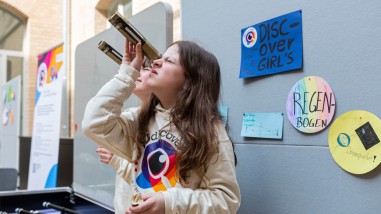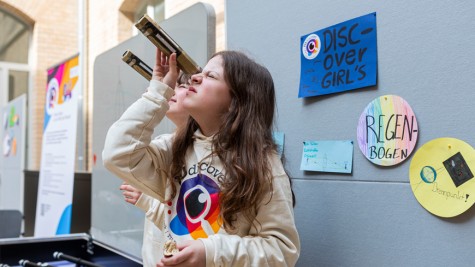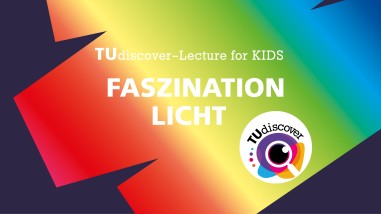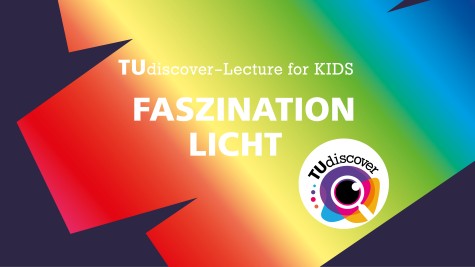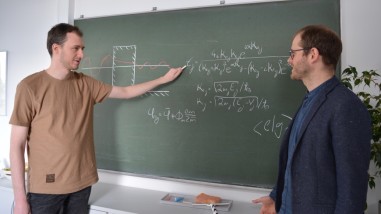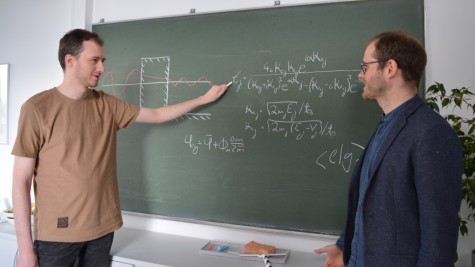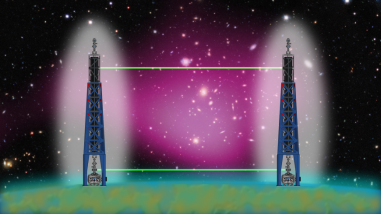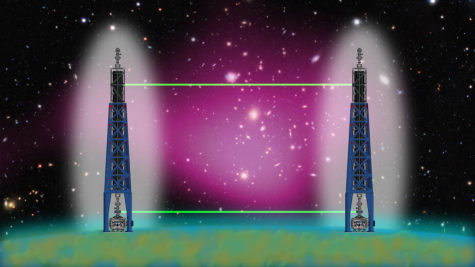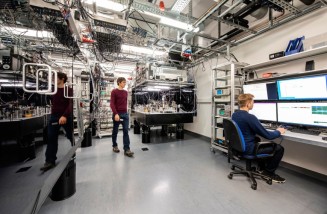Department of Physics
Modern optics
News tagged with “Modern optics”
-
![]() Picture: Patrick Bal
Picture: Patrick Bal![]() Picture: Patrick Bal
Picture: Patrick BalTU Darmstadt zeigt mit DaQLAN ein Quantennetzwerk für die Praxis (German version only)
2025/09/12
Abhörsicher durch Quanten
Wie schützt man Daten, wenn Quantencomputer die heutige Verschlüsselung knacken könnten? Forschende der TU Darmstadt haben ein Netzwerk entwickelt und in Kooperation mit der Deutschen Telekom Technik GmbH außerhalb des Labors installiert, das Quantenphysik für abhörsichere Kommunikation nutzbar macht. Das „Darmstadt Quantum Local Area Network“ (DaQLAN) wird seit über einem Jahr felderprobt. Am 12. September 2025 ist es erstmals öffentlich vorgestellt worden.
-
![]() Bild: Paul Glogowski
Bild: Paul Glogowski![]() Bild: Paul Glogowski
Bild: Paul GlogowskiIAP des Fachbereichs Physik als „Quantenort“ ausgezeichnet
2025/09/10
Festakt am Institut für Angewandte Physik
Die Deutsche Physikalische Gesellschaft (DPG) hat das Institut für Angewandte Physik (IAP) der TU Darmstadt als offiziellen „Quantenort“ im Jubiläumsjahr Quantum 2025 ausgezeichnet. Damit würdigt sie die internationale Spitzenforschung des IAP im Bereich der Quantenphysik und -technologien sowie das Engagement in der Lehre, etwa mit dem neuen Studienschwerpunkt „Quantentechnologie“. Die Auszeichnung wurde heute am Institut in einem Festakt mit Anbringung der zugehörigen Gebäudeplakette gemeinsam mit Vertreter:innen aus Forschung, Präsidium und Presse gefeiert.
-
![]() Bild: Physik | TU Darmstadt
Bild: Physik | TU Darmstadt![]() Bild: Physik | TU Darmstadt
Bild: Physik | TU DarmstadtYoan Spahn | M.Sc.
2025/08/20
Neu bei uns am Fachbereich im IAP | AG Halfmann
Wir haben Yoan Spahn zum Start ein paar Fragen zu seinem Forschungsgebiet und seiner neuen Position als Doktorand gestellt.
-
![]() Bild: Neue Visionen
Bild: Neue Visionen![]() Bild: Neue Visionen
Bild: Neue VisionenQuantum trifft Kino!
2025/07/17
Filmabend mit Vortrag zur Quantenmechanik
Ein Abend für alle, die neugierig sind auf die Quantenwelt oder einfach Lust auf eine besondere Filmvorstellung auf dem Campus der Technischen Universität Darmstadt haben.
-
![]()
![]()
Rückblick: TUdiscover-Lecture for KIDS begeistert Jung und Alt
2025/05/20
Am 26. April 2025 hieß es im Großen Physikhörsaal der TU Darmstadt wieder: Entdecken, Staunen, Mitmachen!
Über 150 Kinder und Erwachsene verfolgten gespannt die Kindervorlesung „Faszination Licht“ mit Prof. Markus Gräfe, der das Publikum mit einer Mischung aus Experimenten, anschaulichen Erklärungen und viel Interaktion begeisterte.
-
![]() Bild: Lena Schwind
Bild: Lena Schwind![]() Bild: Lena Schwind
Bild: Lena SchwindTUdiscover-Girls’ Camp 2025
2025/04/17
Eine Woche voller Neugier, Entdeckungen & Physik!
Was für eine großartige Woche! Gemeinsam mit 25 Mädchen der Klassen 5 bis 7 haben wir im Rahmen des TUdiscover-Girls’ Camps des Fachbereichs Physik experimentiert, gefragt, geforscht – und vor allem: ganz viel gestaunt!
-
![]()
![]()
TUdiscover – Lecture for KIDS: Faszination Licht
2025/03/12
Samstag, 26.04.2025 | 10:00 Uhr | S2|06 Raum 030 (Großer Physikhörsaal)
Kindervorlesung mit spannenden Experimenten, veranstaltet vom Fachbereich Physik | TU Darmstadt. Die Veranstaltung gibt einen Ausblick auf die nächste TUdiscover-Woche 2026 mit dem Thema „Faszination Licht“.
-
![]() Picture: rawpixel -stock.adobe.com/Dominik Pfeiffer
Picture: rawpixel -stock.adobe.com/Dominik Pfeiffer![]() Picture: rawpixel -stock.adobe.com/Dominik Pfeiffer
Picture: rawpixel -stock.adobe.com/Dominik PfeifferAtomic traffic control
2025/02/14
TU researchers have developed and tested a novel technology for even more precise quantum sensors
UNESCO's International Year of Quantum Science and Technology begins with a success for TU researchers at the Institute of Applied Physics: Physical Review Research publishes results of their research on dichroic mirror pulses. These act like velocity-selective traffic controllers for atoms by directing the particles with correct velocity towards detection while letting run troublemakers into the void.
-
![]() Picture: Nature communications | Source: https://www.nature.com/articles/s41467-024-50585-6/figures/1
Picture: Nature communications | Source: https://www.nature.com/articles/s41467-024-50585-6/figures/1![]() Picture: Nature communications | Source: https://www.nature.com/articles/s41467-024-50585-6/figures/1
Picture: Nature communications | Source: https://www.nature.com/articles/s41467-024-50585-6/figures/1Team with TU participation realises quantum sensors in space
2024/08/19
Publication by TU researchers in the renowned journal 'Nature Communications'
An international consortium including the Theoretical Quantum Optics working group led by Professor Enno Giese (Department of Physics at TU Darmstadt) has experimentally realised quantum sensors for the first time on the International Space Station ISS at NASA's Cold Atom Laboratory. The scientists have now published their research results in ‘Nature Communications’.
-
![]() Picture: Christian Karres
Picture: Christian Karres![]() Picture: Christian Karres
Picture: Christian KarresWhat is “time” for quantum particles?
2024/05/16
Publication by TU Darmstadt researchers in renowned journal “Science Advances”
In an amazing phenomenon of quantum physics known as tunneling, particles appear to move faster than the speed of light. However, physicists from Darmstadt believe that the time it takes for particles to tunnel has been measured incorrectly until now. They propose a new method to stop the speed of quantum particles.
-
![]() Picture: CC BY 4.0 DEED / Bearbeitung TU Darmstadt
Picture: CC BY 4.0 DEED / Bearbeitung TU Darmstadt![]() Picture: CC BY 4.0 DEED / Bearbeitung TU Darmstadt
Picture: CC BY 4.0 DEED / Bearbeitung TU DarmstadtDetecting mysterious dark matter with atomic clouds
2024/03/07
Publications in special issue of AVS Quantum Science
-
![]() Picture: Klaus Mai
Picture: Klaus Mai![]() Picture: Klaus Mai
Picture: Klaus Mai1,000 atomic qubits and rising
2024/02/20
A new record for atom-based quantum computers
Making quantum systems more scalable is one of the key requirements for the further development of quantum computers because the advantages they offer become increasingly evident as the systems are scaled up. Researchers at TU Darmstadt have recently taken a decisive step towards achieving this goal. The results of their research have now been published in a prestigious publication.
-
![]() Picture: APQ
Picture: APQ![]() Picture: APQ
Picture: APQResearch at TU Darmstadt selected as breakthrough in optics in 2023
2023/12/04
Scientists at TU Darmstadt extend research on quantum computing to new dimension
December of each year, OPTICA, the U.S. optical society, selects scientific breakthroughs of particular interest to the broad optics community that have emerged over the past year. In this year, research conducted in the group of Prof. Gerhard Birkl at the Institute of Applied Physics at Technische Universität Darmstadt has been highlighted in this exclusive list. The special issue “Optics in 2023” of the journal „Optics & Photonics News” (OPN) reports on work conducted by Malte Schlosser, Dominik Schäffner, and their colleagues, towards advancing unique architectures for quantum computing and quantum simulation.
-
![]() Picture: Walter Oppel
Picture: Walter Oppel![]() Picture: Walter Oppel
Picture: Walter OppelImages as if by magic
2023/11/03
Research of the Experimental Solid State Quantum Optics Group
Quantum physics enables a new form of imaging that could make cancer diagnostics more precise. Physicists from Darmstadt, Jena and Barcelona have made quantum imaging more resilient to noise which may pave the way for practical applications such as in medicine.
-
![Mitarbeiter1_870x489]() Picture: Katrin Binner
Picture: Katrin Binner![Mitarbeiter1_870x489]() Picture: Katrin Binner
Picture: Katrin BinnerOptical effect advances quantum computing with atomic qubits to a new dimension
2023/06/01
Publication in Physical Review Letters
Quantum computers might be able to crack currently unsolvable tasks, but it is not easy to expand them to the necessary size. A new technique from a team of Darmstadt physicists could overcome this hurdle.
-
![]() Picture: Walter Oppel
Picture: Walter Oppel![]() Picture: Walter Oppel
Picture: Walter OppelTracking tumors with quantum optics
2023/02/08
TU research team works on new tool for cancer diagnostics
Quantum imaging enables insights into previously invisible areas. Can tumour diagnostics also benefit from this? The TU Darmstadt, which has special expertise in quantum optics, is now investigating this question together with eight partners. The Quancer research project has a budget of 6.7 million euros and is being funded with 5.6 million euros in the framework programme “Quantum Technologies – from basic research to market” by the Federal Ministry of Education and Research (BMBF).
-
![]()
![]()
Bright quantum light source with low energy requirements
2022/11/02
Previously unachieved spectral brightness
In cooperation with researchers from Taiwan and Ukraine, a physics team from TU Darmstadt has achieved an important success in quantum optics. The scientists succeeded in demonstrating a quantum light source of previously unattained spectral brightness per pump power. Their results have now been published in the scientific journal “Quantum Science & Technology”.
-
![]() Picture: Erik Fitzke
Picture: Erik Fitzke![]() Picture: Erik Fitzke
Picture: Erik FitzkeSecure communication with light particles
2022/05/25
Researchers at TU Darmstadt are developing an anti-eavesdropping quantum network
While quantum computers offer many novel possibilities, they also pose a threat to internet security since these supercomputers make common encryption methods vulnerable. Based on the so-called quantum key distribution, researchers at TU Darmstadt have developed a new, tap-proof communication network. Their results have now been presented in the renowned journal “PRX Quantum”.
-
![]() Picture: Klaus Mai
Picture: Klaus Mai![]() Picture: Klaus Mai
Picture: Klaus MaiScalable quantum processors in sight
2021/12/15
TU Darmstadt project paves the way for powerful quantum computers
A physics research group at the TU Darmstadt, which is being funded with 3.3 million euros as part of the federal “Quantum Technologies” program, is providing new impetus by combining state-of-the-art optical technology techniques with the most advanced methods of quantum optics, which facilitate scalable manipulation of quantum states.
-
![]() Picture: Katrin Binner
Picture: Katrin Binner![]() Picture: Katrin Binner
Picture: Katrin BinnerNew dimensions in quantum physics
2021/06/25
Developing high-performance computers using qubits
Theoretical physicist Vladimir M. Stojanović took a circuitous route to his research on quantum computers. He is now presenting findings that could provide decisive impetus to this field of research.
Only the 20 most recent of 21 news items are displayed.











